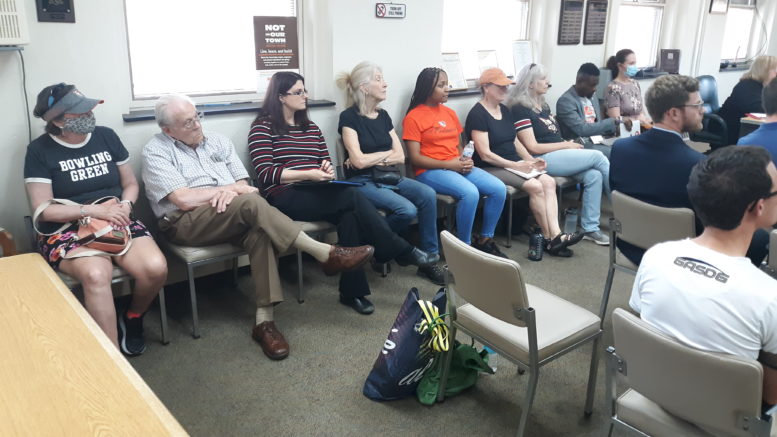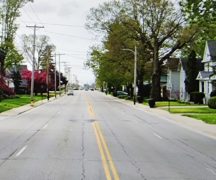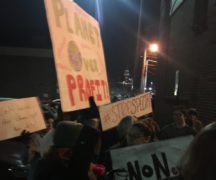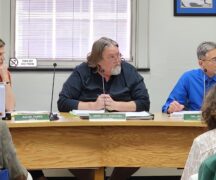By JAN LARSON McLAUGHLIN
BG Independent News
The ideas for how to spend COVID relief funding in Bowling Green have quickly outpaced the $3 million yet to be allocated.
Earlier this year, the city received hundreds of proposals for the American Rescue Plan Act funds. On Thursday evening, City Council’s Committee of the Whole heard more impassioned pleas from local residents for shares of the funding.
The pitches covered projects from new tennis courts, a proposal to keep Westgate yards safe from hungry deer, a woodworking shop at the senior center, and help for a new motorized scooter business.
“This is just one source of input,” City Council President Mark Hollenbaugh said, noting the number of ideas already submitted in the city’s questionnaire seeking ARPA proposals.
Council member Bill Herald said a rough estimate of the funding asked for Thursday evening totaled $2.5 million.
Other ideas will be accepted by the city until May 31, and may be emailed to the council clerk. Then it will be up to City Council to whittle down the requests.
“We’ll be making the hard choices,” Hollenbaugh said.
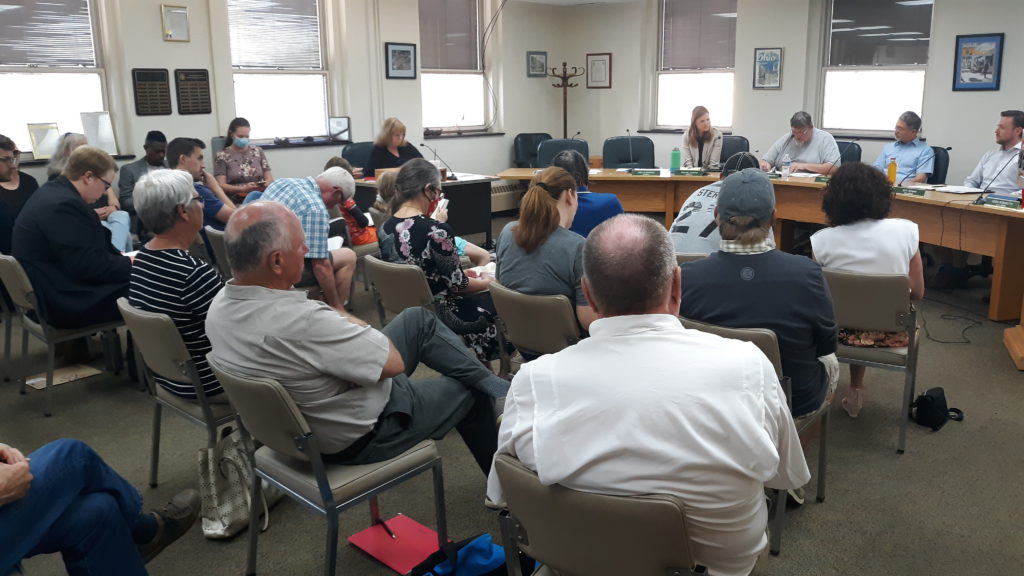
Following are the proposals pitched to City Council Thursday, in order of the least to most expensive:
$5,000 or so to help residents of the Westgate area preserve their yards from hungry deer. Resident Dan Kitz said the deer from Wintergarden Park and the Bordner Meadow area eat shrubbery, trample flower beds and rub the bark off young trees with their antlers.
“The deer are free to casually walk in and make a smorgasbord of our neighborhood,” Kitz said.
He suggested that a section of vinyl fence with a self-closing gate be installed at the deadend of Martindale Street, which leads into the park.
$10,000 to help equip a woodworking shop at the new Wood County Senior Center in Bowling Green. Greg Robinette spoke on behalf of the Wood County Committee on Aging, which would like to create a woodworking shop in the center’s basement.
The workshop could be used for community projects, furniture repairs for seniors, rehabilitation for veterans, and teaching opportunities.
The total cost would be $50,000, but the Committee on Aging is requesting $10,000 from the city.
$20,000 to update the disc golf course in Carter Park. The GAS Disc Golf nonprofit organization is based in Bowling Green, and is the only organized disc golf group between Columbus and Ann Arbor, according to member Kevin Vollmar.
“Disc golf is affordable and accessible,” Vollmar said. The equipment is inexpensive and it’s free to play. The sport is environmentally friendly, good exercise, and can be played by all ages and ability levels.
With improvements, the disc golf course would stimulate the local economy by bringing tournaments to Bowling Green, Vollmar said.
It would take just $20,000 to make it a “top notch” course, he said.
“It’s a huge sport and it’s growing massively,” Vollmar said.
The disc golf course requires no maintenance other than regular mowing, he added.
$50,000 to $75,000 for Bowling Green Economic Development to develop a feasibility analysis for an innovation and entrepreneurship accelerator.
The study would examine the demand for entrepreneurial and small business services, space needs and availability, programming options, governance models, and funding and sustainability plans, according to Kati Thompson, director of the city’s economic development efforts.
“We want to be targeted in our efforts,” she said.
This would help “move the needle forward” for Bowling Green in its efforts to encourage entrepreneurs, retain and attract talent, keep BGSU students after they graduate, and diversify the local economy.
The one-time funding would give the city a better chance at getting matching funds for the construction of an “incubator,” Thompson said.
$100,000 for Wood County District Public Library to help with three expenses made necessary by the city’s new government building plans. Library Director Michael Penrod stressed that the library is a willing partner in the changes.
“We have a long history of a good, strong relationship and working together,” Penrod said. But he did point out the expenses the library faces:
- $47,000 to help cover the relocation of the library drop-off box to West Court Street.
- $10,000 for a door from the children’s area of the library to the new green space to be located between the library and city building.
- $53,000 of the total $125,000 in parking lot modifications allowing parking for both buildings.
“None of the above was on the library’s radar until late 2020 when plans for the new city building were announced,” Penrod said.
$117,638 for an electric scooter business in the city. Shakir Blackett, of Micro-mobility, said he is an example of the kind of entrepreneur the city is looking for.
The scooters would offer affordable transportation, with their small lightweight vehicles that operate under 25 mph.
The scooters are seen in many larger cities, but Blackett said efforts are increasing to get into smaller communities. The scooters create less traffic congestion, less pollution, and are fun to ride, he said.
BGSU is interested in the business, but is waiting for the city to get on board, Blackett said.
“Help us to bring Micro-mobility to Bowling Green,” he said.
Up to $200,000 for dog parks on public land in the city, closer to residents than the dog park out by the dog shelter off East Gypsy Lane Road.
Raul Ascunce encouraged city leaders to not focus on the “what ifs.” He pointed out the projects that were completed despite “what ifs” – like the skate park, aquatics center, community center, baseball park, disc golf course, inline skate rink, and the proposed pickleball courts.
“We do not fear the ‘what ifs,’” Ascunce said. “Bowling Green is able to see beyond the ‘what ifs.’”
Dog parks would attract current residents, prospective residents, college students and tourists, he said.
“Dog parks are an excellent way to bring people from all parts of the city together, from all walks of life together, whose only commonality is their dog,” Ascunce said. “It’s a great way for people and dogs to build a stronger sense of community.”
$280,000 for four projects for Downtown BG. “They all support more foot traffic for our downtown businesses,” said Tony Vetter, executive director of Downtown BG. The request was broken down into:
- $40,000 to fund the remainder of the new holiday decorations for downtown.
- $40,000 to $50,000 for a downtown speaker system for safety announcements and festive music. “Music takes you to a time and place that makes you feel good,” Vetter said. And the safety announcements could cover such events as a tornado or gas line break, he said.
- $100,000 for the alley revitalization project that would include improvements such as pergolas and artwork.
- $100,000 for downtown building facade improvements. Grants would be offered to businesses willing to make matching investments.
“A community is only as strong as its downtown,” Vetter said.
$300,000 for new community tennis courts at Bowling Green High School. Will Airhart asked the city to enter a partnership with private citizens and the school district to build eight to 10 tennis courts on school grounds, with a total price tag of $750,000.
The current courts are in such poor shape that some tennis matches have been canceled when visiting teams refuse to play on them, Airhart said.
If eight to 10 courts are built, the site could host tournaments and raise funding for maintenance.
According to Airhart, $100,000 has already been committed in private funding. The city is being asked to put in $300,000.
$320,000 for an award-winning interactive art piece to bring joy to the city after two long years of COVID. Jennifer Karches asked that the city look into building “musical swings,” which play different notes and sound like different musical instruments from each swing when they are used.
“It’s a beautiful musical experience,” Karches said. “This could be a catalyst for attracting more people to live and work in Bowling Green.”
The $320,000 cost does not include shipping or installation, she said.
$325,000 to help the Cocoon finish its renovation project started eight years ago on its building in Bowling Green. Kathy Mull, director of the Cocoon, which serves survivors of domestic and sexual violence, explained the three phases of renovations at the facility.
The first phase turned the building into a 24-bed shelter. The second phase made space for group programs and providers to serve survivors.
The third phase will create a comprehensive advocacy center, she said. Currently, there is no private space to meet with survivors, except those living in the shelter. So staff often meets with survivors in the community.
The $325,000 would also help update security at the facility.
“It will transform the way we provide services in our community,” Mull said.
Mull pointed out that in 2021, the Cocoon served 818 survivors, with at least 60% of those being from Bowling Green.
Up to $400,000 to build six pickleball courts in the parking lot by the water tower in Carter Park, with fencing and parking.
Pickleball is the fastest growing sport in America, according to Bob Kreienkamp. The sport spans generations, and keeps people active from their youth to senior years.
“It’s important we make those later years as enjoyable as possible,” he said.
“This will certainly make Bowling Green a much more attractive place for seniors,” Kreienkamp said.
Local seniors now travel to neighboring communities to play pickleball, then spend their money at restaurants and shops there.
Pickleball is a sport accessible to all income levels – unlike golf, he said. “People with tight budgets can afford pickleball,” he said.
The pickleball courts could be made sustainable by using them for tournaments. That would require space for vendors, restrooms, ample parking, shade, and nearby restaurants and hotels, Kreienkamp said.
$415,700 for grants to downtown small businesses. The businesses suffered losses during downtown construction, which was then followed up by more hardships from the COVID pandemic, according to Mary Vollmar.
“These people are a gem to this city,” Vollmar said of the downtown businesses.
“These are businesses that have gone through the road closures and the shutdown for COVID,” she said. “They have to catch up with ongoing expenses.”
The grants would be made available to privately-owned downtown businesses that had signed business space rent contracts and purchased merchandise inventory before the pandemic shutdowns.
Owners who have purchased or opened their business in the current downtown location for 15 years or less, and have monthly rent expenses will be given priority.

